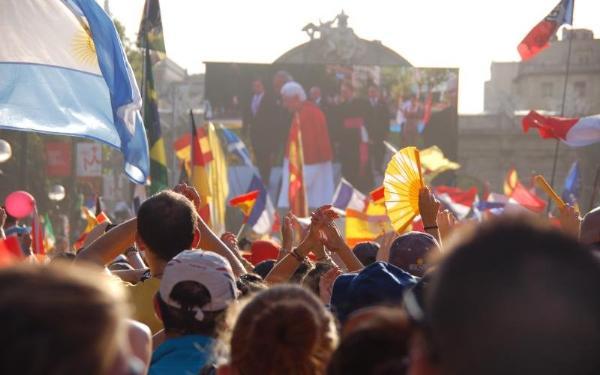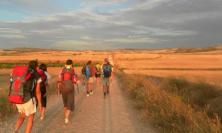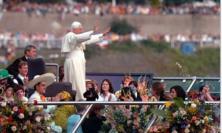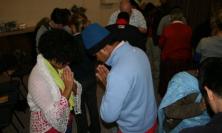One month after the end of MAGiS and World Youth Day 2011, Niall Leahy SJ describes his eventful and invigorating week in Madrid. How could the encounters with God and between pilgrims that took place this summer happen on a more local level, helping the hundreds of thousands of World Youth Day pilgrims and others to remain, ‘Planted and built up in Jesus Christ, firm in the faith’?
As 99 groups of MAGiS pilgrims were being funnelled into a Jesuit college in the suburbs of Madrid, Spain inhaled and held its breath. Hanging in the dry August air was the familiar mix of furtive excitement and nervousness that papal visits always seem to evoke. Not everyone wanted World Youth Day (WYD) to be a success it seemed and the Spanish media alluded tersely to the reservations that were bubbling away in the public sphere. By contrast, caution was the last thing on the mind of the more than 1 million young people who were gearing up for the biggest Catholic show on earth.
It’s fair to say that most MAGiS pilgrims were running low on steam after the exertions they made during the week of experiences. Our hosts had mercifully decided on a quiet schedule for the first evening in Madrid: all that was planned was an outdoor Mass in the college grounds followed by what can only be described as MAGiS’ answer to the Royal Variety Show. The show was intended to communicate something of what pilgrims had experienced whilst they had been scattered around the Iberian peninsula during the previous week. An array of live music, video, photography and theatre kept us engaged and entertained for over two hours. Several acts succeeded in bringing the audience to a moment of contemplation. I think in particular of a video clip, which was made by a group in Lisbon, that reflected on the practice of finding God in all things.
The organisers of WYD issued each pilgrim with an invaluable events guidebook. As I reacquainted myself with my trusty sleeping bag that night, I flicked through the guide hoping to get an overview of how the following five days would pan out. There was no shortage of talks and liturgies so it was important to identify and prioritise those events which appeared most stimulating or relevant to one’s own situation. I came up with rough plan that would include a few catechetical talks given by attending bishops, a Taizé prayer service, a talk by Christopher West on relationships and sexuality, a seminar on Church and new media, and last but not least, the liturgies at which Pope Benedict XVI was to preside. Of course the implicit assumption amongst all of this was that my schedule would be punctuated with the occasional café con leche or ice cream beside the lake in the Parc del Retiro. No point in risking over-exhaustion, you see.
The two catechetical talks that I attended were given by Cardinal Keith Patrick O’Brien, Archbishop of St Andrews and Edinburgh, and the Archbishop of Dublin, Dr Diarmuid Martin. Both men were unmistakably pleased to address the young pilgrims on the WYD theme of, ‘Planted and built up in Jesus Christ, firm in the faith’. It was equally pleasing for those of us present to hear two senior clerics addressing us with unequivocal frankness and honesty. Speaking from the heart and sharing generously from his own experiences, I thought Cardinal O’Brien did an excellent job of normalising the role of faith in our lives. Given that the young pilgrims had made a counter-cultural choice to attend World Youth Day, perhaps even exposing themselves to the derision of their peers, the Cardinal’s address was, above all else, reassuring. His account of suffering many setbacks during his own faith journey demonstrated how perseverance is essential if we are to be truly ‘firm in the faith’. In contrast, Archbishop Martin struck a more urgent note. He highlighted the fact that the demographics of the Church in the western world do not bode well for the future. Stressing the importance of having an intelligent faith as opposed to vague notions of God, he urged us to spend time with the scriptures and explore key questions that Christianity raises, such as the divinity of Christ and humanity’s need of salvation. He also pressed upon us how Christians should value the culture of the times without letting themselves be controlled by it; inspiration should be drawn instead from the goodness of the Gospel. I thought the energetic and contemporary presentation of the Catholic faith at MAGiS and WYD was a good example of precisely this being put into practice.
A popular feature of these sessions (which were held all over the city in several languages) was the opportunity to ask the presiding bishop a question after he had spoken. These Q&A sessions were vibrant and engaging, and demonstrated that young adults have a thirst for intellectual conversation around their faith. There is clearly a demand for this format which could be tapped into at grass roots level, and not just when the Pope visits! The questions reflected the real issues that were at play in the pilgrims’ lives. One line of questioning focused on the Church’s position on sexual morality, which many people find to be unreasonable. Archbishop Martin reframed the issue, highlighting that the Church has a fundamentally positive view of sexuality, family life, the human body and procreation. It was this same message that Christopher West expanded on, in his talk to an incredibly receptive crowd of 3,000 people. You won’t find too many advertisers who would say that ‘chastity sells’, but clearly they have never heard this man speak. Anyone who works with young people will tell you that they are quick to spot a fraud but thankfully this talk wasn’t sugar-coated. There were no scare tactics, nor did he moralise or tell people what they could or couldn’t do. In fact, the audience began to see through the deception of advertisers and media moguls who have short-changed the world by selling a cheap imitation of sex which paradoxically has compromised our sexual freedom. Drawing on the mystical experiences of Saint Theresa of Avila, he connected the spiritual with the sexual and invited the young pilgrims to get in touch with their own hopes and desires and to take them seriously. The audience left knowing that their desire for physical intimacy is good and healthy, but also that a decision to exercise self control can equally be an act of love. Once again, the openness and enthusiasm with which this presentation was received left me wondering why this kind of talk isn’t being made available to more young people back home.
The Pope’s hope for World Youth Day was that the young pilgrims would ‘use these days to know Christ better’. The invitation to encounter and become like Christ was a constant thread in his homilies. While the invitation was clearly extended, in my opinion not enough effort was made to create a space where this encounter could actually happen. The best young adult retreats that I have attended have enshrined some quiet time for prayer, meditation or reflection in the schedule. For newcomers to the faith in particular, the carnival atmosphere in Madrid may have been a distraction from the gentle call to be alone with the Lord. It was with this in mind that I sought out the Taizé community who had based themselves in the magnificent Spanish-American Basilica of the Merced. There, the prayerful atmosphere provided the perfect foil to the swarming crowds and oppressive heat outside on the streets. Their idiomatic chanting speaks to the soul of a global community of believers. I find it a remarkable expression of the universal appeal of the Gospel to the human heart.
Back on the streets, some protestors were vocalising their grievances at taxpayers’ money being used to finance the papal visit. WYD has also received criticism from within the Church. Some people say that WYD encourages young people to revere the Pope like a celebrity rather than to respect him as the successor of Peter. There is probably some truth to this but on balance I would describe the relationship between Pope Benedict and the young flock as being one of affection rather than adulation. Benedict XVI, like his predecessor, and like so many good priests, takes young people seriously. You can’t help but respond to that, and the young people in Madrid did so with warmth and goodwill.
I had my ‘Oh my God, it’s the Pope!’ moment in Birmingham this time last year when he celebrated Mass for the beatification of Blessed John Henry Newman. Seeing him for a second time was less dramatic, but his homilies still focused on the person of Christ and still struck a chord with me. Faced with a world full of contradictory and ambiguous voices, he urged us to, ‘listen regularly every day as if he were the one friend who does not deceive, the one with whom we wish to share the path of life’. I also liked his nod in the direction of St Ignatius’s rules for the discernment of spirits as he warned us against taking the paths, ‘which leave emptiness and frustration in their wake’. I wonder if he does the Examen before going to bed...
Continuing with another Ignatian theme, I witnessed the idea of going in through somebody else’s door in order to take them out through your own, being put into practice. Both MAGiS and WYD targeted the web and social networking sites very effectively, reaping the benefits of the opportunities offered by these platforms. More importantly, I’ve seen that if the Church puts its mind to it, it can connect with young people. It seems to be more a matter of priority than of means. The young people whom I accompanied to Spain wanted get the most out of every moment of their pilgrimage. The schedule asked for a big commitment of energy and engagement at the physical, emotional and spiritual levels. They were rewarded richly by God. Speaking to them at a reflection day one month after MAGiS, it seemed like their horizons had been stretched, and living a fulfilling life has become less of a dream and more of an immediate possibility. If more young people want to have this experience, do they have to wait for Rio in 2013? What if they can’t afford the price of a plane ticket, or are uncomfortable with other people subsidising them to fly half way around the world? Surely we can host these types of events on a smaller scale and closer to home. I am convinced that the demand is there if we are willing to meet it.
If the events of this summer encourage more people to get involved in youth ministry that is great news, for our Church and for each person who will be given the chance to meet Christ in and with others – I’ll be joining them, as soon I have caught up on my sleep!
Niall S. Leahy SJ was a co-ordinator of the MAGiS group from Ireland and is now beginning studies in philosophy at Heythrop College, University of London. He lives in a Jesuit community in Wapping.
![]() Read about the first ten days of MAGiS, in Loyola and the week of experiences: ‘The long and winding road’ by Frances Murphy
Read about the first ten days of MAGiS, in Loyola and the week of experiences: ‘The long and winding road’ by Frances Murphy
![]() MAGIS 2011
MAGIS 2011
![]() Pope Benedict’s homily at the Papal Welcome Mass
Pope Benedict’s homily at the Papal Welcome Mass






